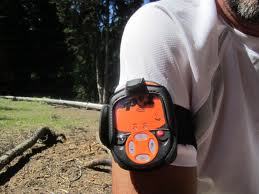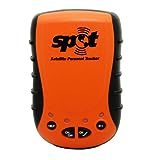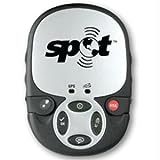
Imagine you’re driving or trekking, or living, hours from nowhere and things go seriously wrong. Medical emergency, auto failure, up to your neck in quicksand, even under attack from looters. No cell-phone reception and nobody around to send for help. Now what?
With a cell-phone-sized Spot Emergency messager, just push the appropriate button and rescuers are on the way. The SPOT Satellite Messenger is what’s known as a personal locator beacon, designed to summon aid from places conventional communication can’t reach. Buy it here in the US. Buy it here in the UK.
For anything less than a life-and-death situation, a Help button transmits your GPS coordinates to your emergency contacts via text message and e-mail — accurate to 20 feet based on testing. Contracted professional services are notified as well. That info goes out every 5 minutes for an hour or until you cancel it.
 In dire circumstances, like those listed at the top of this article, the SOS button sends your message and coordinates to the GEOS International Emergency Response Coordination Center, where it’s relayed to the emergency personnel best suited to your location. That might be any agency from the local police to your local Embassy if you’re in a jam overseas. SPOT claims more satellites in its SOS network than anyone else in the business, allowing the receiver to get a fix and get the word out when speed counts most.
In dire circumstances, like those listed at the top of this article, the SOS button sends your message and coordinates to the GEOS International Emergency Response Coordination Center, where it’s relayed to the emergency personnel best suited to your location. That might be any agency from the local police to your local Embassy if you’re in a jam overseas. SPOT claims more satellites in its SOS network than anyone else in the business, allowing the receiver to get a fix and get the word out when speed counts most.
When all’s well, the OK button sends a preprogrammed thumbs-up text/e-mail message to reassure everybody back at the ranch. Or send a different note by holding down the Custom Message button. Changing messages or contacts is as easy as logging onto the SPOT website and typing. All that will cost you $99 for a year of basic SPOT service, plus $169.99 for the GPS Messenger.
Engineered to withstand temperatures from -20 to 140 degrees Fahrenheit, the 5.2-ounce unit is tougher than any survivalists. It’s quite waterproof as well. After nearly a year of being dropped on concrete floors and bouncing around in tankbags and jacket pockets, a SPOT test device is still accurate and bulletproof.
Negatives: As with any GPS receiver, you need a clear shot at those satellites. The Messenger can have a hard time finding itself under heavy tree cover or in a narrow, rocky ravine. Power comes from three AAA Energizer Ultimate Lithium batteries, which should last about three months — carry an extra set just in case. Even if you never send for help, just knowing you could is worth the initial investment. SPOT offers various alternatives, including the Connect, which lets a Smartphone talk to communication satellites when you’re way off-grid.
Price: $169.99 plus $99 per year. But there are others such as ACR Aqualink 406 2882 Personal Locator Beacon Includes Internal GPS, 5-Year Battery, Belt Clip, Lanyard and LED Strobe Light
Contact: SPOT LLC
7 Responses
I never thought I would find such an everyday topic so ehntarlling!
true, but even off-gridders still have purposeful service many use all the time. you dont have a well you hire water delivered, cant fix your wind turbine you hire it done, want to watch tv you use stored power or a generator to run the satellite, every thing in life is a trade off. nowhere does it say “just cause im off-grid i give up all that i consider a luxury or a need” to me its like saying if you are off-grid you cant go to a grocery store, well we only have a limited fussy growing season in the desert. not gonna cut my nose to spite my face, i will still have things that need to be acquired from other souces. this device is no different. everyone has there own idea of off-grid, the only truly trustful thing an off-gridder can say is that they make their own power, usually out of necessity. it would cost us 25000.00 dollars to have power run 1/2 mile plus we would get to pay for the poles, 500.00 a pop. so it comes down to affordable choices. and we all make those ourselves.
But it sure isn’t off-grid. Its totally dependent on a global support network!
i can see some usable benefits for medical uses in tracking mentally ill also. suppose someone in your family were mentally ill but they had this device on and they wandered off, a simple med alert tag worn on chain could tell someone what button to push to get this person back to there home or loved ones home. i think the price would be priceless for that kind of security to know someone is there to help anytime anywhere. can you imagine their relief to find someone found instead of injured or worse.
Len, beat me to it! There is nothing “off the grid” about this product. This is the antithesis to the ideas of this site….
How is this “off-grid”? It is entirely grid based. Not disagreeing with any of the up sides, but If I want to bug out… I don’t want anyone to know where I am.
Acquaintances of mine took a SPOT to the Bahamas. They found a nice anchorage and decided to stay for a week. They forgot to tell people back home and when nothing had been recieved for a couple of days back home the family alerted the coast Guard saying something had gone wrong. A day or so later including an expensive aircraft search and numerous patrol boat man hours being involved someone cruised up to the safely anchored boat with a message.
” call home you are listed as missing at sea”
Talk about embarassing not to mention an expensive search involving lots of government assets expending money that might have been better spent in a search for someone who really needed help. If you intend to stop and turn off your unit to save batteries let someone know first.